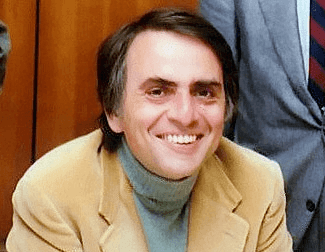When Pro Scientists Explain Using Pop Science
Table of Contents
Abstract
There is so much to say about the many endeavors by professional scientists to explain to us the world. The list is long: Carl Sagan, Harald Lesch, Neil deGrasse Tyson, Sabine Hossenfelder, Michio Kaku, and I even saw Roger Penrose and Steven Hawking on TV. The list is – of course – considerably longer than that. Even the subject isn’t new:
Albert Einstein: What I most admire about your art, is your universality. You don’t say a word, yet the world understands you!
Charles Chaplin: True. But your glory is even greater! The whole world admires you, even though they don’t understand a word of what you say.
You’ve probably heard about this quotation (## \sim## 1932), however, it cannot be verified. Nevertheless, it brings us directly to the matter. For one, the world of communication has changed dramatically ever since, and secondly, nobody cares about whether something can be verified. But even this isn’t new. Someone to whom I told an anecdote about a professor we both knew replied:
Brooks Ferebe: I don’t think this story is true. Its charm is that it could be true.
That was about forty years ago. There is so much to say about …
Erich Kästner: Es gibt nichts Gutes, außer man tut es. 1950.
(There is nothing good unless you do it.)
… so I decided to add my two cents to a discussion that frequently turns up on physicsforums.com whenever someone read or watched, better: consumed an explanation of a phenomenon – usually from astrophysics or quantum mechanics, occasionally mathematics – given by someone who is a reputable and respected scientist who tries honestly to share their knowledge with us all.
Motivation – The Public
It is certainly hard if not even impossible to pick a few reasons for the motivation of thousands. There are probably as many reasons as there are people who read scientific articles in popular magazines. And although I am well aware of the scientific simplifications that have to be made in such articles, I do read some of them myself. There is of course the simple curiosity that is an impetus that cannot be overrated. We spent huge amounts of money just because of that. Think about CERN, FAST, or the ISS. Other biological constraints are the dopamine receptors in our nucleus accumbens. It simply feels good if we receive the message that we have learned something. Whether we did is irrelevant to dopamine. This is an add-on compared to other forms of entertainment. There are probably also sociological reasons for people to read popular science articles e.g. having an interesting topic at party small talk. But this depends heavily on the society we speak about and, let’s face it, would be a guess from my side.
Other aspects, based on a much smaller sample size of why people read popular science articles can be seen by the questions that reach us on physicsforums.com. They often begin with a “why …” or end up with “… is it real?” The best answer to any “why” questions is probably Richard Feynman’s interview about magnetism, see [2]. However, it has an unsatisfactory conclusion: why questions cannot be answered unless we spend a lot of time on elaborating what a valid answer would be! Unfortunately, the question about reality is equally unanswerable. The philosopher must bring us closer to what reality means. Physicists only measure and mathematicians only deduce. Whether their truths can be called real doesn’t bother them. The only shortcut to thick philosophical books is art: Margery Williams’s book The Velveteen Rabbit (1922), Stanisław Lem’s The Futurological Congress (1971), or the Wachowski brothers’ movie The Matrix (1999).
Whatever your motivation may be, please have a look at, better read of the few articles in my source list at the end of this article, especially Feynman [2] and Asimov [3], but also Wigner [4] and Englert [5] are worth reading.
Motivation – The Publisher
The publishers’ motivation is far easier to predict:
Maximum revenue at minimum cost.
This may not be the most idealistic view of economic activity, but it is the most honest one. The result is more than often an article on the publisher’s website written by some journalist, if we are lucky a science journalist, in the shortest time possible and in a way that maximal many people will remain on the site. The latter has some serious and unpleasant consequences which we will discuss in a moment. Now, it is only important to recognize that publishers of science websites do not have any order to teach us, not even a moral commitment.
Motivation – The Scientist
We are back from our short trip to rationalism and back in the jungles of biology, sociology, characters, personal taste, economic needs, and yes, even politics. So why do scientists help to produce popular science publications, be it on the internet, in magazines, or on TV? This isn’t supposed to be a study about personal decisions made by some scientists, so I will keep it short. My personal experience tells me that outside of their scientific comfort zone, scientists behave just like any other human being. Believe it or not, popular science is indeed outside of their scientific comfort zone, even if it is usually well hidden behind the attitude of certainty. There is no dialogue, hence every statement and every explanation is a guess, a compromise about what common people might understand or not.
Edward III of England: Honi soit qui mal y pense! 1348.
However, it is not all bad, not at all. Most scientists you see on tv do not suffer from any economic needs, or have a political agenda, and can be trusted. You can see it in their faces which shine with pure enthusiasm when they report about the results in their fields. They want to share their knowledge. Just don’t forget it is always a compromise based on an unspoken assumption about us as their audience, about our knowledge.
Good Luck, Bad Luck, and Superposition
 Once a scientist decides to turn to the dark side, popular science, they might become publicly judged by other scientists who consider themselves the true scientists. This is even true in a way since once you spend your time on TV shows you will lose time to research. It is sometimes also a matter of age or simply personal priorities! Funnily, there are three categories into which scientists can fall. Carl Sagen, and Steven Hawking, were lucky. Their deviation into popular science didn’t downgrade them. Others, like a famous string theorist, were less lucky, and to again others, like a famous quantum gravity physicist who ironically is in this state of superposition, it is not yet clear whether they will turn into good or bad luck category. In whatever category they will fall, at least, they have tried to make us all a bit smarter and science a bit more popular.
Once a scientist decides to turn to the dark side, popular science, they might become publicly judged by other scientists who consider themselves the true scientists. This is even true in a way since once you spend your time on TV shows you will lose time to research. It is sometimes also a matter of age or simply personal priorities! Funnily, there are three categories into which scientists can fall. Carl Sagen, and Steven Hawking, were lucky. Their deviation into popular science didn’t downgrade them. Others, like a famous string theorist, were less lucky, and to again others, like a famous quantum gravity physicist who ironically is in this state of superposition, it is not yet clear whether they will turn into good or bad luck category. In whatever category they will fall, at least, they have tried to make us all a bit smarter and science a bit more popular.
The Internet
“Money For Nothing” by the Dire Straits was the first music video that was aired on MTV Europe on August, 1st, 1987. It couldn’t be more telling than this! What all changed in our lives ever since? We have become used to many quick cuts on a TV screen, consumption of information by 0.3 Hertz. What happened on October, 13th, 1994? Netscape Navigator opened the world of free information on the internet. Quick access at no cost became the new normal. This has had far-reaching consequences. High-standard journalism struggles with its financing all over the world. Fake news became a common slur. It doesn’t even require falsification anymore. The opposite is the case, evidence disturbs. Not even 30 years ago, it was reserved for the yellow press and nobody felt the need to even speak it out. The media had been divided into entertainment and information. Then infotainment has been invented, and finally, in desperation of what can be trusted or not, fake news. This shouldn’t be understood as a rant of modern times.
Ronnie O’Sullivan: It’s all part and parcel of life. You know, just words at the end of the day … but it is what it is, you know? (Sheffield, 2023)
However, there are consequences to be considered. We no longer read this one local newspaper in the morning. No, we are online these days. Websites by the dozens curry favor for our clicks. And they know, we won’t stay very long. 40 seconds on average! (Nielson rating, [6]) This requires a constant supply of new food. Quantity instead of quality, flashlights instead of research. Astrophysics for click-baiting headlines about extrasolar planets, black holes, the Big Bang, or dark something. Its language uses many common words suggesting it can be understood even by laymen. Quantum physics is a reservoir for curiosities, the stranger the better. How often have I read about particle-wave duality, a concept that has been outdated for decades? Or virtual particles? Quantum computing translated to revolutionary faster computers without even a word about what kind of algorithms can be improved and which can not. Even mathematics can make the headlines when a scientific celebrity in his last days like Michael F. Atiyah claims to have solved the Riemann hypothesis, which is usually translated as a breakthrough that threatens our internet security (cp. [7]). I do not blame the journalists because the editors require quick results for the broadest possible clientele and …
Stephen Hawking: Someone told me that each equation I included in the book would halve the sales. (1988)
… nips any attempt at the seriousness in the bud. Simplifications beyond recognition must be made. Instead, we are urged to read the same explanations of what dark matter, dark energy, or neutrinos are over and over again. Even Einstein’s rings became popular. Einstein sells!
The Ivory Tower
The misconception that common language is taken for common knowledge is not new. A surgeon who normally only reads his specialist journals once read in a hotel during breakfast in a magazine that Einstein wanted to abolish ether. Then he closed the magazine and muttered while shaking his head …
unknown surgeon: A little appendicitis would probably be enough to convince this gentleman of the necessity and usefulness of ether!
A curse under which especially astronomy and cosmology still suffer today. However, the ivory tower of science hasn’t become more diaphanous – quite the opposite is true. The more we get to know in detail, the more complicated are linguistical and far more mathematical descriptions we need to lay down the facts. This means in return, that enormous simplifications have to be made to transform knowledge into words that can be understood by non-scientists. The gap is increasing and on the internet are Fata Morgana mirages. It sells illusions of information. The science is somewhere else and hidden in entire buildings constructed in a language only insiders can understand. This is the problem every single scientist faces who contributes to popular science TV shows, the internet, magazines, or newspaper articles. We can blame them for taking part in the sale of illusions, and some scientists do, we can likewise praise them for trying to transport knowledge, and many people do, but either way, the gap is a fact.
Epilogue
It remains to conclude. How should we deal with that gap between scientific insights and understandable descriptions? How can we trust a professional scientist if we know that he can only vaguely explain to us what he knows? Does it make sense to read The Brief History of Time, watch Prophets of Science Fiction, or more ambitious, read the blogs of Terence Tao or Sabine Hossenfelder? We won’t get a step closer to understanding general relativity because we read Stephen Hawking, we won’t understand string theory because Michio Kaku shares with us his visions about future technologies, nor will we become a mathematician if we try to follow Terence Tao’s little theorems, or will be enlightened in physics if we follow Sabine Hossenfelder’s criticisms of the current state of physics.
No. We must stop expecting such goals. It is not what has been intended. Hawkings did his best to explain the universe to us, Kaku is entertaining when he meets with all these nerds you see at conventions. And honestly, following Terry’s blog keeps your little grey cells alive. And of course, Bine’s pamphlets are not the last word of wisdom. They are intended to provoke, to keep the discussion of how we do physics alive. We should be thankful since any withdrawal from skepticism and criticism leads to the putative necessity of comfort like the ether was!
Efforts by any professional scientist who produces some kind of popular science should be welcome. They open the door of knowledge a crack so that we can glimpse a shiny light of science. It is not meant to make us scientists, and, I am sorry to say this, not even allow us to have a reasonable say. Yes, they often sell the illusion of insights, but not even scientists in one field have insights into other fields of science.
Eugene P. Wigner: The miracle of the appropriateness of the language of mathematics for the formulation of the laws of physics is a wonderful gift that we neither understand nor deserve. We should be grateful for it and hope that it will remain valid in future research and that it will extend, for better or for worse, to our pleasure, even though perhaps also to our bafflement, to wide branches of learning.
And we should be grateful for everybody who tries their best to translate this language for us, who won’t get tired of reading us the scientific papers in their field in our language, and in a way that we can at least share their enthusiasm for the deep-rooted greed in us humans to search after the ultimate truths. However, these publications are not scientific, which is why they are not acceptable sources for us on physicsforums.com. Enjoy them, but don’t mistake them for real science.
Sources
Sources
[1] Carl E. Sagan, Image of the only scientist I know of who has explained not only the world to us but also us to the world.
https://de.wikipedia.org/wiki/Carl_Sagan#/media/Datei:Carl_Sagan_Planetary_Society.JPG
[2] Richard P. Feynman, Interview about the ‘Why’ Question, Magnets
https://www.youtube.com/watch?v=MO0r930Sn_8
[3] Isaac Asimov, The Relativity of Wrong, The Skeptical Inquirer, Vol. 14 No. 1, Fall 1989, pp. 35-44.
https://www.sas.upenn.edu/~dbalmer/eportfolio/Nature%20of%20Science_Asimov.pdf
[4] Eugene P. Wigner, The Unreasonable Effectiveness of Mathematics in the Natural Sciences, Communications in Pure and Applied Mathematics, Vol. 13, No. I (February 1960). New York:
John Wiley \& Sons, Inc.
https://www.maths.ed.ac.uk/~v1ranick/papers/wigner.pdf
[5] Berthold-Georg Englert, On Quantum Theory, Centre for Quantum Technologies and Department of Physics, National University of Singapore, Singapore, 2013
https://arxiv.org/pdf/1308.5290.pdf
[6] Average Duration Time on a Website
https://www.mso-digital.de/wiki/verweildauer/
[7] The History and Importance of the Riemann Hypothesis
https://www.physicsforums.com/insights/the-history-and-importance-of-the-riemann-hypothesis/










I have tried to avoid any bashing of specific persons in my article. Of course, I, too, had the usual suspects in mind and named some of them – hopefully without any judgments. One has always to keep in mind whom they address, by which media channel, and at what time of the day. All these factors are normally disregarded when it comes to discussions like the one that evolved here right now. It is easy to criticize those who actually do something instead of taking action instead. I had to learn this myself recently. I drew the personal consequence of reducing my activities at PF drastically. If they are considered “meaningless” then it’s time to stop them. Fortunately, none of the mentioned scientists are members here AFAIK.
This thread is closed now.
”
De Grass is not Greener when Neil explains the afterlife
;).
”
Tyson recently advertised an online show in which he stated he will ( paraphrase) teach people to think. Thanks, Neil, how would I manage without you.
”
I don’t know if this is the thread for it so apologies if this post is misplaced and delete it if so.
[MEDIA=youtube]IqInAZdbPX8[/MEDIA]
I believe there are different classes of popularizers
1) those who are active in science research and want to reach people and slowly push them in the direction of actual science
2) those who are completely ego driven and do nothing to push people in the direction of studying actual science. But rather feed their ego about understanding the most trivial facts.
I believe the most egregious example of the latter is Neil DeGrasse Tyson.
In the clip referenced he says that dead bodies feel cold because they are no longer giving off heat as a byproduct of energy breakdown.
While this sounds fascinating it’s essentially equivalent to
“Touching a car engine that’s on will burn you while touching a car engine that’s been off for awhile won’t”
How does this reveal anything new or get viewers to study deeper intricacies (such as the virial theorem)?
It does nothing but enable NDGT to stroke his ego by revealing middle school facts.
”
De Grass is not Greener when Neil explains the afterlife
;).
”
How can that possibly be the case? The words of Einstein cannot be taken as gospel. If it’s nonsense it’s nonsense, no matter who says it!
”
Those “quotations” tend to become autonomous especially if they are not equipped with a clear reference.
Here is a link where someone tried to narrow it down, and – how surprising – found a different picture:
[URL]https://history.stackexchange.com/questions/35209/which-of-these-quotes-are-actually-einsteins-if-any[/URL]
”
Interesting article, thanks. Considering Pop Science, it makes one, again ponder a quote attributed to Einstein.
“If you can’t explain it to a six-year-old, you don’t understand it yourself.” ― Albert Einstein
–wes
”
How can that possibly be the case? The words of Einstein cannot be taken as gospel. If it’s nonsense it’s nonsense, no matter who says it!
PS from reading the post below, it seems Einstein never said this in the first place.
”
Much of fundamental science research is funded by tax payers. Pop sci is one way to give back / inform them what their money goes to
”
Giving them the Covid vaccine is an even better way!
”
but there are a lot of odd scientists
who had: Kolmogorov started from philology ; Nash and Kantorovich obtained Nobel for economics
”
Clifford was known as an excellent teacher, and for his essays on the philosophy of science. He also wrote a book about fairy tales for children The little people. And he was a philosopher, and he seems to have been quite quarrelsome in his short life.
”
“but not even scientists in one field have insights into other fields of science.”
”
but there are a lot of odd scientists
who had: Kolmogorov started from philology ; Nash and Kantorovich obtained Nobel for economics
”
I recall [USER=366323]@bhobba[/USER] making a thread about a Leonard Susskind book and he said “this is progress for science beyond its banal popularizations” (paraphrasing)
”
His books are far from polarisations in the sense of being the real deal; including the math. Yet are popularisations by being on the best seller list. Very unique. All you need is a smattering of calculus.
Thanks
Bill
Since member [USER=58864]@symbolipoint[/USER]’s answers were rude and ad hominem, I banned him from replying in this thread.
”
Still too vague. Look at least to yourself. You have insights into other sciences than in which you earned your degree.
”
Yes.
”
Or is this not true? No. Almost certainly it must be true.
”
Would you mind stopping
a) your accusations
b) answering a pamphlet I did not write
c) your ad hominem arguments
d) your ramblings
and start instead
d) to use a politer language
e) actually read what I wrote instead
f) to find back to a serious reasoning
Thank you.
”
Other than that, maybe if you ‘feel’ you do not have insights of other sciences, you know other people in Sciences. You can check with them about what insights they have in other sciences. Some of these people must have those other insights. Further – people who were your professors? Knew any who earned degree in one field and later a degree in a DIFFERENT field? Certainly you knew some.
”
How can you even dare to judge what experiences I have or not?
”
Still too vague.
”
What a profound comment.
”
Look at least to yourself. You have insights into other sciences than in which you earned your degree. Or is this not true? No. Almost certainly it must be true. Other than that, maybe if you ‘feel’ you do not have insights of other sciences, you know other people in Sciences. You can check with them about what insights they have in other sciences. Some of these people must have those other insights. Further – people who were your professors? Knew any who earned degree in one field and later a degree in a DIFFERENT field? Certainly you knew some.
”
I’m still waiting in full expectation for your deep knowledge about a von Neumann universe.
”
Much too vague
”
Well, I have written a comment, not a pamphlet. It reflects my experiences and does not aim to provoke.
Criticism first and asking second would be a suitable method to answer a pamphlet. It is, however, rude in case of a comment. See, there are a lot of fine lines to draw!
An example: A mathematician I knew well has written a book about Virasoro algebras, but it didn’t make him a string theorist – although he tried!
Perhaps an elobaration of “insight” is in place then?
”
What counts as a “field” here? We can for sure say that physics and biology are two separate fields, but say surface physics and solid state physics have many things in common.
”
No, that’s not the point. The crucial point is the word “insight” which in my opinion goes beyond general knowledge.
What counts as a “field” here? We can for sure say that physics and biology are two separate fields, but say surface physics and solid state physics have many things in common.
”
That in bold, simply not true.
”
It is true. A few counterexamples are insufficient to disprove the trend. The trench between applied mathematics and pure mathematics, or physics and mathematics is deeper than you apparently think, let alone chemistry, biology, or non-STEM fields. Some knowledge in physics does not make a mathematician someone who has [U]insights[/U] into physics.
… or what can you tell me about a von Neumann universe that cannot be found on Wikipedia?
Much of fundamental science research is funded by tax payers. Pop sci is one way to give back / inform them what their money goes to
Impossible to prove, but Sagan’s efforts at popularization probably did hurt him, e.g., the National Academy off Sciences affair. From
[URL]https://www.smithsonianmag.com/science-nature/why-carl-sagan-truly-irreplaceable-180949818/[/URL]
“Sagan’s emergence as the country’s top science popularizer ruffled many of his colleagues. Much of science is, as Sagan himself noted, prohibitive in nature, setting limits on what is and is not physically possible—thou shall not go faster than the speed of light, and so on. Beyond that, the scientific community as a social and even political entity has a number of clear and well-enforced, if unwritten, rules, including, Thou shalt not speculate, thou shalt not talk about things outside your immediate area of expertise, and thou shalt not horse around on late-night TV talk shows.
The scientific community’s divided opinion about Sagan came to a head in 1992, when Sagan was on the verge of being elected, as part of a larger pool of 60 nominees, to the National Academy of Sciences. A rump caucus of scientists within the Academy made a fuss, saying Sagan hadn’t accomplished enough in his research. After a hot debate, with Sagan supporters defending his hard-science achievements, the frowners prevailed, and Sagan’s name was flicked from the list of the newly anointed. Sagan received condolence letters from outraged colleagues; in an interview with me a few years later he shrugged it off, saying he’d always assumed he’d never get in. But Druyan told me, “It was painful. It seemed like a kind of unsolicited slight.” The Academy tried to salve the wound in 1994 by giving Sagan an honorary medal for his contributions to public understanding of science.”